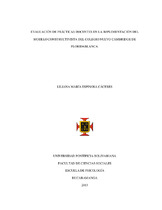| dc.contributor.advisor | Director. Muñoz Rondón, Tatiana Milena | |
| dc.contributor.author | Espinosa Cáceres, Liliana María | |
| dc.coverage.temporal | 2013 | |
| dc.date.accessioned | 2020-09-24T14:05:40Z | |
| dc.date.available | 2020-09-24T14:05:40Z | |
| dc.date.issued | 2013 | |
| dc.identifier.uri | http://hdl.handle.net/20.500.11912/6072 | |
| dc.description | 116p.: (pdf); il; imágenes; tablas; anexos. | spa |
| dc.description.abstract | Teniendo en cuenta la importancia de estudiar el modelo pedagógico del Nuevo Cambridge School, esta investigación se diseñó con el interés de analizar la implementación de los principios constructivistas en las prácticas docentes. A partir del sustento teórico y cuatro categorías de análisis: estudiante, proceso de aprendizaje, maestro y evaluación, de las cuales se derivan los 16 principios constructivistas planteados por el grupo de investigación Saber, Educación y Docencia de la Universidad Pontifica Bolivariana Seccional Bucaramanga. El estudio es de Tipo Mixto (cuantitativo-cualitativo) en el que se utilizaron dos instrumentos: (a) la encuesta prácticas docentes y (b) el formato de observación del aprendizaje, diseñados por el grupo de investigación. Se pudo identificar que el Nuevo Cambridge School es una institución que posee fortalezas la construcción del conocimiento en interacción con objetos, instrumentos o materiales tecnológicos; en el diseño de espacios de aprendizaje significativo; en presentar el proceso de aprendizaje como un reto para la auto-superación del estudiante. En contraposición se encontró escasa implementación en la construcción de conocimiento basada en saberes previos, la realimentación de los resultados y la participación de los diferentes actores del proceso (maestro, estudiantes y compañeros), predominando la evaluación individual. | spa |
| dc.description.abstract | The objective of this study was to analyze the implementation of constructivist principles in teaching practices, by four categories of analysis: student, learning process, teacher and evaluation, of which 16 are derived from constructivist principles raised by the research group called "Saber, Educaci6n y Conocimiento", of the Universidad Pontificia Bolivariana, Seccional Bucaramanga. The study was mix, combine quantitative and qualitative methodology and used a battery for two different kinds of instruments: the survey of teaching practices, and the learning observation format designed by the research group. The results was analyze by triangulation, which seeking for more interrelationships between findings. It was identified that the New Cambridge School is an institution that has strengths and knowledge in building interactions with objects, tools or technological materials, to design meaningful learning spaces, for presenting the learning process as a challenge to the self-overcoming student. In contrast, was found a poor implementation in the construction of new knowledge based on an already obtained previously knowledge as well, the feedback of results and the participation of different actors in the process as teachers, students and class mates, with the individual assessment as the predominantly characteristic. | eng |
| dc.format.mimetype | application/pdf | |
| dc.language.iso | spa | |
| dc.publisher | Universidad Pontificia Bolivariana | spa |
| dc.rights | Attribution-NonCommercial-NoDerivatives 4.0 International | * |
| dc.rights.uri | http://creativecommons.org/licenses/by-nc-nd/4.0/ | * |
| dc.subject | Escuelas - Colegio Nuevo Cambridge | spa |
| dc.subject | Docente personal | spa |
| dc.subject | Universidades - Universidad Pontificia Bolivariana | spa |
| dc.subject | Encuestas | spa |
| dc.subject | Evaluación educativa | spa |
| dc.title | Evaluación del prácticas docentes en la implementación del modelo constructivista del Colegio Nuevo Cambridge de Floridablanca | spa |
| dc.type | Trabajo de grado | spa |
| dc.publisher.department | Escuela de Ciencias Sociales | spa |
| dc.publisher.program | Psicología | spa |
| dc.type.hasVersion | publishedVersion | spa |
| dc.description.sectional | Bucaramanga | spa |
| dc.description.degreename | Psicólogo | spa |


